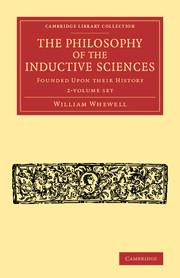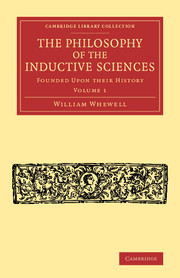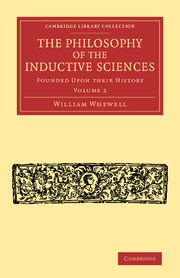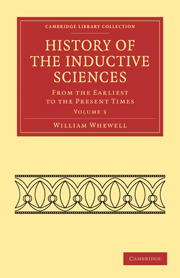The Philosophy of the Inductive Sciences 2 Volume Set
First published in 1840, this two-volume treatise by Cambridge polymath William Whewell (1794–1886) remains significant in the philosophy of science. The work was intended as the 'moral' to his three-volume History of the Inductive Sciences (1837), which is also reissued in this series. Building on philosophical foundations laid by Immanuel Kant and Francis Bacon, Whewell opens with the aphorism 'Man is the Interpreter of Nature, Science the right interpretation'. Whewell's work upholds throughout his belief that the mind was active and not merely a passive receiver of knowledge from the world. A key text in Victorian epistemological debates, notably challenged by John Stuart Mill and his System of Logic, Whewell's treatise merits continued study and discussion in the present day. Volume 1 investigates the philosophy underlying pure, classificatory and mechanical sciences. Volume 2 includes a selective review of opinions on the nature of knowledge and the means of seeking it, beginning with Plato.
Product details
January 2014Multiple copy pack
9781108064040
1246 pages
220 × 140 × 80 mm
1.4kg
Temporarily unavailable - available from TBC
Table of Contents
- Volume 1: Preface
- Aphorisms respecting ideas, knowledge, and the language of science
- Part I. Of Ideas:
- 1. Of ideas in general
- 2. The philosophy of the pure sciences
- 3. The philosophy of the mechanical sciences
- 4. The philosophy of the secondary mechanical sciences
- 5. The philosophy of the mechanico-chemical sciences
- 6. The philosophy of chemistry
- 7. The philosophy of morphology, including crystallography
- 8. Philosophy of the classificatory sciences. Volume 2: Part I. Of Ideas (cont.):
- 9. The philosophy of biology
- 10. The philosophy of palaeontology
- Part II. Of Knowledge:
- 11. Of the construction of science
- 12. Review of opinions on the nature of knowledge, and the means of seeking it
- 13. Of methods employed in the formation of science.






